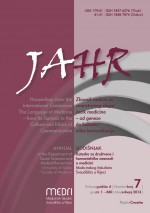Neurocriticism: a contribution to the study of the etiology, phenomenology, and ethics of the use and abuse of the prefix neuro-
Keywords:
brain, neuroscience, word coinageAbstract
The last few decades, beside being proclaimed "the decades of the brain" or "the decades of the mind," have witnessed a fascinating explosion of new disciplines and pseudo-disciplines characterized by the prefix neuro-. to the "old" specializations of neurosurgery, neurophysiol-ogy, neuropharmacology, neurobiology, etc., some new ones have to be added, which might sound somehow awkward, like neurophilosophy, neuroethics, neuropolitics, neurotheology, neuroanthropology, neuroeconomy, and other.Placing that phenomenon of "neuroization" of all fields of human thought and practice into a context of mostly unjustified and certainly too high – almost millenarianistic – expectations of the science of the brain and mind at the end of the 20th century, the present paper tries to analyze when the use of the prefix neuro- is adequate and when it is dubious.
Downloads
Published
Issue
Section
License
Authors who publish with this journal agree to the following terms:
- Authors retain copyright and grant the journal right of first publication with the work simultaneously licensed under a Creative Commons Attribution License that allows others to share the work with an acknowledgement of the work's authorship and initial publication in this journal.
- Authors are able to enter into separate, additional contractual arrangements for the non-exclusive distribution of the journal's published version of the work (e.g., post it to an institutional repository or publish it in a book), with an acknowledgement of its initial publication in this journal.
- Authors are permitted and encouraged to post their work online (e.g., in institutional repositories or on their website) prior to and during the submission process, as it can lead to productive exchanges, as well as earlier and greater citation of published work (See The Effect of Open Access).



